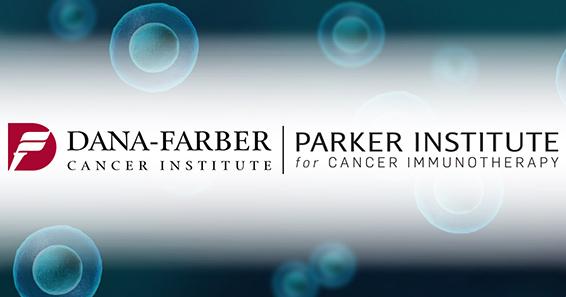Dana-Farber Cancer Institute Joins the Parker Institute for Cancer Immunotherapy
Collaborative Relationship Integrates More of the Brightest Minds in Cancer Immunotherapy to Accelerate Research and Save Lives
The Parker Institute for Cancer Immunotherapy today announced that researchers at Dana-Farber Cancer Institute have joined its network. Dana-Farber is a leader in cancer research and brings a team of experts who will collaborate with Parker Institute investigators to enhance and expand research projects and clinical trials. Dana-Farber's expansive clinical trial capabilities and strong immuno-oncology research approach will complement the current work at the Parker Institute, specifically in checkpoint inhibitor resistance.
Leadership at both institutions have worked together to identify projects that support the Parker Institute's strategic roadmap. Projects include those focused on basic mechanisms underlying checkpoint inhibitor resistance and immune activation and priming. Clinical research could include trials that integrate checkpoint therapies with cancer vaccines. In many cases, these projects will be collaborations with Parker Institute investigators at other institutions.
"Dana-Farber has been involved in the Parker Institute from the beginning, and President and CEO Laurie Glimcher played a critical role in the development of our model and our research strategy," said Jeffrey Bluestone, PhD, CEO and President of the Parker Institute. "Dana-Farber is a longstanding innovator in oncology and has a very strong history of collaboration. Its team of outstanding investigators will add immense value to our network and help accelerate the development of cancer immunotherapies with the greatest chance of impact on patients."
The Parker Institute created a flexible model to easily expand its network and recruit world-class talent like the researchers at Dana-Farber. The researchers joining the Parker Institute include:
Nicholas Haining, BM, BCh, is a physician-scientist at Dana-Farber Cancer Institute and the Broad Institute of Harvard and MIT who studies the mechanisms underlying T-cell exhaustion and immune evasion by tumors. Dr. Haining's lab uses cellular immunology, functional genomics, epigenetics and single cell profiling to understand why protective T-cell memory fails to occur in cancer and chronic viral infection, and how tumors avoid immune attack.
Catherine Wu, MD, is an internationally recognized physician-scientist with expertise in cancer genomics, immunogenomics and the design and testing of personalized cancer vaccines. A major priority of her studies is the identification of tumor-specific antigens that would allow effective tumor targeting without collateral toxicity. She is an Associate Professor of Medicine at Dana-Farber Cancer Institute and Harvard Medical School, and Institute Member of the Broad Institute of Harvard and MIT.
Philip Kranzusch, PhD, is an Assistant Professor in the Department of Cancer Immunology and Virology at Dana-Farber Cancer Institute and the Department of Microbiology and Immunobiology at Harvard Medical School. His lab uses structural and biochemical approaches to understand how the immune system recognizes cancer and is currently focused on harnessing the cGAS-STING pathway to control immune signaling and anti-tumor immunity.
F. Stephen Hodi, MD, is an internationally recognized leader in developing immune therapy and melanoma therapeutics, particularly known for the clinical development of checkpoint inhibitors. He led the first human trial of ipilimumab, which blocks the CTLA-4 checkpoint. This later led to the Phase III registration trial, which was the first study to show a survival advantage for a melanoma drug, leading to FDA approval of ipilimumab. Dr. Hodi has continued as a key investigator in the clinical development of the second family of checkpoint inhibitors, which block PD-1 and PD-L1, and have improved outcomes in many other malignancies, such as lung and kidney cancer.
"We are thrilled to be joining the Parker Institute research endeavor. The best way to make a huge impact in the field of oncology is to work collaboratively with leading researchers and institutions. This approach will help us overcome barriers that stand in the way of developing revolutionary therapies," said Laurie H. Glimcher, MD, President and CEO of Dana-Farber Cancer Institute and a member of the Parker Institute's scientific steering committee. "Dana-Farber is continuing to advance the rapid progress seen in immuno-oncology over the past five to ten years, and we are honored to be part of the impressive team that the Parker Institute has convened. We are hopeful that with so many talented scientists working in unison toward a common goal, we will have many positive outcomes."
As part of the Parker Institute, Dana-Farber will have access to innovative tools, resources and services. They include clinical trial management, bioinformatics and data analysis, and intellectual property management to help drive the research forward.
"We are thrilled to have our colleagues and collaborators from Dana-Farber Cancer Institute joining the Parker Institute," said Jedd Wolchok, MD, PhD, Parker Institute center director at Memorial Sloan Kettering Cancer Center. "The Parker Institute was not created to solely include a set number of institutions; rather, its overarching goal is to integrate the best efforts of the most outstanding scientists and physicians in the field of cancer immunotherapy. Together, our aim is to discover and investigate the most innovative means to use the power of the immune system to control cancer."
Learn more about the collaboration between the Parker Institute for Cancer Immunotherapy and Dana-Farber.
Media Contacts
If you are a journalist and have a question about this story, please call 617-632-4090 and ask to speak to a member of the media team, or email media@dfci.harvard.edu.
The Media Team cannot respond to patient inquiries. For more information, please see Contact Us.
